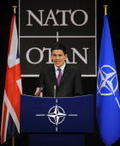 David Miliband has become the latest to suggest that the Coalition must talk to sections of the Taliban in Afghanistan. The foreign secretary said it was necessary to build “an inclusive political settlement” which included former insurgents who could be persuaded to renounce violence. And he made an increasingly familiar distinction between ”hard-line ideologues”/jihadists and more moderate groups who are currently involved in the insurgency, but who could be ‘drawn into a political process’.
David Miliband has become the latest to suggest that the Coalition must talk to sections of the Taliban in Afghanistan. The foreign secretary said it was necessary to build “an inclusive political settlement” which included former insurgents who could be persuaded to renounce violence. And he made an increasingly familiar distinction between ”hard-line ideologues”/jihadists and more moderate groups who are currently involved in the insurgency, but who could be ‘drawn into a political process’.
Miliband’s speech was part of a concerted government push on Afghanistan. International Development Secretary, Douglas Alexander, told the Today programme this morning that a focus on dialogue was one of the lessons of the British experience of Northern Ireland: “I think people recognise from the experience of places like Northern Ireland that it is necessary to put military pressure on the Taliban while at the same time holding out the prospect that there can be a political process that can follow”; military operations, he noted, were ‘only part of the solution’.
But Miliband and Alexander are missing that what Northern Ireland really shows is that there is a huge difference between talking to terrorists who are on the crest of a wave and those who are starting to tread water. Suggesting talking to the Taliban after Britain’s Afghan mission has sustained heavy casualties and the media is full of talk of withdrawal sends the wrong message.
Whitehall, along with a significant portion of the security establishment, has long been inebriated with ‘the lessons of Ulster’ for some time. Mandarins fly to the trouble spots of the world, giving lectures on IRA-style accommodations, in which yesterday’s terrorists become tomorrow’s statesmen. Earlier this year, the British Foreign Office reanimated contacts with Hezbollah and several senior British MPs invited Hamas to participate in a video-link discussion in Westminster. Northern Ireland was cited as an inspiration in both cases.
Yet the reality of what happened in Northern Ireland was much more complex. Timing was everything and talking to the IRA was often counterproductive – undermining moderates and encouraging the terrorists to think that they had the initiative. It was only in the 1990s, after nearly thirty years of violence that the right conditions for dialogue were meticulously established. Crucially, this was only after a long-haul security campaign had fought the IRA to a stand-still.
So how are we to take these latest remarks? On the one hand, they are clearly part of the same old script; Miliband continues to assert Britain’s moral authority in a way that is evocative of Robin Cook’s ‘ethical foreign policy’. On the other hand, reading between the lines of Alexander’s comments, there is reason to believe that a more hard-headed and realistic approach to tackling the Afghan insurgency is beginning to take hold.
Until recently, talking has been seen as an alternative to fighting – a benign palliative in which reason triumphs over the machismo characteristic of the Bush era. But in its latest incarnation, the proponents of the Northern Ireland model seem more prepared to acknowledge that talking and fighting can be part of the same strategy; an olive branch makes more sense only in the aftermath of Operation Panther’s Claw.
What’s really changed is not the patter of British diplomacy but the military backdrop to the conflict, with the recent ‘surge’ of coalition troops, particularly in Helmand. The influence of David Kilcullen’s ideas is increasingly visible in American counter-insurgency strategy – more troops, alongside more sensitivity to the landscape of local tribal networks and customs. An Anbar-style ‘awakening’ is not beyond the realms of possibility in Afghanistan. But it’s worth remembering that the US got its best results from ‘talking’ in Iraq, only after the surge of troops kicked in. The UK’s back-room accommodation with the militias in Basra, by contrast, was an abject failure that led to the town having to be ‘re-liberated’; it should not be the model for Afghanistan.
It is often said that there is no military solution in Afghanistan, but equally there is no solution without the military. If the Coalition chooses to negotiate, it should do so from a position of strength.






Comments